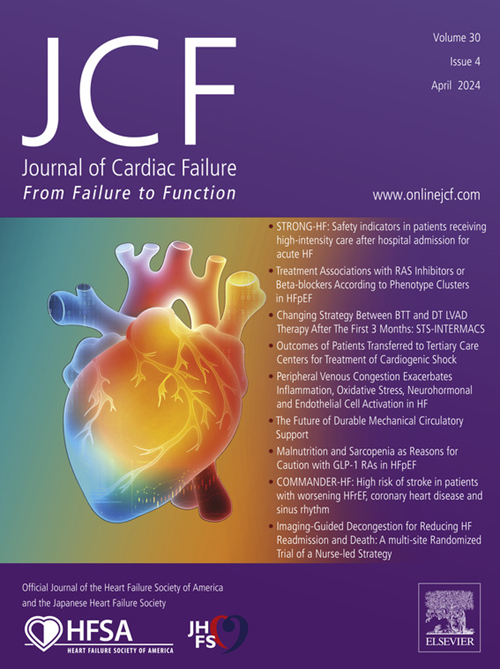Rationale and Design of the Personalized Therapy Study: Evaluating Real-World Performance of Two Automated Defibrillation Therapy Algorithms
IF 8.2
2区 医学
Q1 CARDIAC & CARDIOVASCULAR SYSTEMS
引用次数: 0
Abstract
Background
Barriers to maximizing patient benefit with implantable defibrillation devices include limited ability to tailor antitachycardia pacing (ATP) therapy in real time and identify patients at risk of heart failure (HF) events early on. The Personalized Therapy study aims to evaluate the performance of 2 algorithms, intrinsic ATP (iATP) and TriageHF, to address these barriers in routine clinical practice.
Methods and Results
The Personalized Therapy Study was designed as a prospective, multicenter, post-market registry study expected to enroll approximately 2200 patients meeting the following criteria: (1) implanted with a study-eligible device regardless of procedure type, (2) Medtronic CareLink Network enrolled, (3) TriageHF enabled within CareLink and High-Risk Alert notifications turned ON, and (4) iATP enabled. The primary study objectives are to demonstrate iATP effectiveness in the fast ventricular tachycardia zone and estimate the positive predictive value of TriageHF high-risk status for worsening HF. Additionally, objectives include characterizing iATP effectiveness in all ventricular detection zones and characterizing TriageHF-based clinical actions and related HF hospitalizations.
Conclusion
This study is expected to generate real-world evidence on the performance of the iATP and TriageHF algorithms, which aim to improve clinical practice by tailoring arrhythmia and HF therapies to individual patient disease states.
个性化治疗研究的基本原理和设计:评估两种自动除颤治疗算法的实际性能。
背景:植入式除颤装置最大限度地提高患者获益的障碍包括实时定制抗心动过速起搏(ATP)治疗的能力有限,以及早期识别有心力衰竭(HF)事件风险的患者的能力有限。这项个性化治疗研究旨在评估两种算法的性能,即固有的ATPTM (iATP)和TriageHFTM,以解决常规临床实践中的这些障碍。方法和结果:个性化治疗研究被设计为一项前瞻性、多中心、上市后注册研究,预计将招募约2200名符合以下标准的患者:(1)无论手术类型如何,植入符合研究条件的设备;(2)注册了美敦力CareLink®网络;(3)在CareLink中启用TriageHF,并打开高风险警报通知;(4)启用itp。本研究的主要目的是证明iATP在快速室性心动过速区的有效性,并估计TriageHF高危状态对心衰恶化的阳性预测价值。此外,研究目标还包括表征所有心室检测区的iATP有效性,以及基于TriageHF的临床行为和相关的hf住院情况。结论:本研究有望为iATP和TriageHF算法的性能提供现实世界的证据,旨在通过针对个体患者疾病状态定制心律失常和心衰治疗来改善临床实践。
本文章由计算机程序翻译,如有差异,请以英文原文为准。
求助全文
约1分钟内获得全文
求助全文
来源期刊

Journal of Cardiac Failure
医学-心血管系统
CiteScore
7.80
自引率
8.30%
发文量
653
审稿时长
21 days
期刊介绍:
Journal of Cardiac Failure publishes original, peer-reviewed communications of scientific excellence and review articles on clinical research, basic human studies, animal studies, and bench research with potential clinical applications to heart failure - pathogenesis, etiology, epidemiology, pathophysiological mechanisms, assessment, prevention, and treatment.
 求助内容:
求助内容: 应助结果提醒方式:
应助结果提醒方式:


